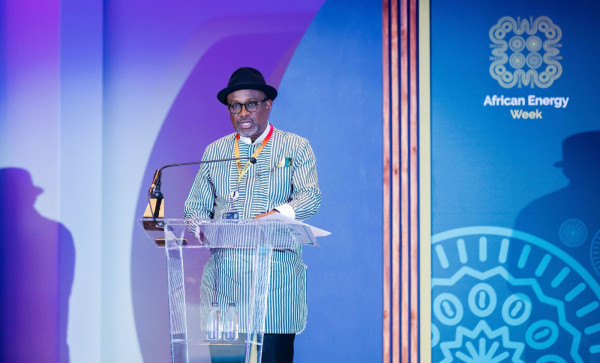By NJ Ayuk, Executive Chairman, African Energy Chamber (www.EnergyChamber.org)
Earlier this month, the African energy sector learnt of Simbi Wabote’s replacement from his position as executive secretary of the Nigerian Content Development and Monitoring Board (NCDMB). He was appointed to the position by President Muhammadu Buhari in September 2016.
Wabote’s abrupt exodus (which was not explained) has sparked a range of reactions, highlighting the complexity of his legacy in championing domestic participation in the oil and gas industry.
We at the African Energy Chamber (AEC) were disheartened to hear of this development. Throughout his years of service, Wabote demonstrated an unwavering commitment to fostering local content policies that not only benefited Nigerians but also created opportunities for other Africans. He did not use local content as a wedge issue to drive resource nationalism, but instead promoted intra-African collaboration and worked with his counterparts in other African countries to support their local content initiatives. Nigeria lead and shared lesson learned.
We greatly respect Wabote’s push for transparency in local content and contracting issues, as well as his advocacy for Africa’s oil and gas industry: He never shied away from speaking out for a just energy transition.
Wabote can take pride in his achievements with the NCDMB. By encouraging a balanced, market-friendly approach to local content, he fostered a generation of African entrepreneurs.
Championing Local Content
Wabote was no stranger to developing local content in complex situations when he arrived at NCDMB.
He spent 26 years at Shell Petroleum Development Company (SPDC) Nigeria Limited where he rose to the position of general manager of business and government relations for Shell Companies in Nigeria (SCiN). During his time with the company, he held numerous senior positions inside and outside of the country and spent years overseeing the development of local content strategy and framework, including a stint as the general manager of local content for Shell companies worldwide.
As the NCDMB executive secretary, Wabote was tasked with steering strategic national programs to build capacity and locate industry activities within Nigeria. His global experience was key in re-engineering the board’s business processes to achieve maximum impact on the country’s content development.
Wabote’s success with the NCDMB included establishing a number of highly impactful funds. With the creation of the USD350 million Nigerian Content Intervention Fund (NCIF,) for example, Wabote and the NCDMB were able to provide affordable credit for Nigerian oil and gas service companies and local contractors.
“This contributed greatly in addressing the challenge of affordable capital which hamper the growth of many indigenous service providers,” Wabote wrote in a 2022 opinion piece published by Premium Times.
Under Wabote’s leadership, the NCDMB also launched a fund to drive local manufacturing of oil and gas industry equipment and components, a research and development fund to solve energy industry problems, and a working capital fund to help oil and gas companies overcome the damaging effects of the COVID-19 pandemic.
I applaud these efforts, along with the NCDMB’s USD40 million Women in Oil and Gas Intervention Fund, created in partnership with the Nigerian Export-Import (NEXIM) Bank to benefit oil and gas firms where women hold majority shares or manage the companies.
Throughout Wabote’s tenure on the board, he pushed for increased indigenous participation in oil and gas contracts, and drove investments in local manufacturing and skills development. He forged strategic collaborations with international oil companies, universities, and training institutions to enhance local capacity building and technology transfer. And he implemented initiatives to improve transparency in NCDMB operations and combat corruption within the oil and gas sector.
Overcoming Challenges That Remain
Despite Wabote’s NCDMB work toward policy advancements, critics argue that the actual implementation of local content requirements has fallen short, with loopholes and lack of enforcement hindering progress. Concerns exist about the unequal distribution of benefits from local content initiatives, with larger companies often benefiting more than smaller enterprises and local communities.
Wabote created an environment where the NCDMB cannot pick winners and losers and pit industry sectors against each other in order to achieve sustainable local content goals. We saw him push to drive up Nigeria’s and Africa’s competitiveness, our oil and gas sector cannot continue to be faced with over overregulation that sometimes hurts businesses when it comes to creating jobs and opportunities for everyday people.
The AEC hopes that Wabote’s successor, Felix Ogbe, will continue the efforts toward robust local content development, building upon Wabote’s initiatives while addressing implementation gaps and any other concerns.
We would love to see the board continue to foster inclusivity and empower local communities. And we are anxious to see whether the new leadership will uphold the high standards of transparency and combatting corruption that are essential to maintain public trust and ensure the effectiveness of local content initiatives.
”(President) Tinubu expects this highly qualified body of experts to discharge their duties with a patriotic resolve to significantly enhance indigenous industry participation in the energy sector,” the President’s media advisor said in a statement regarding the new board members, adding that the Tinubu administration has a mandate to achieve 70% indigenous content in Nigeria’s energy industry during the president’s years in office.
Let’s hope that this comes to fruition and that the NCDMB continues to build upon the foundation Wabote supported throughout his leadership.
Distributed by APO Group on behalf of African Energy Chamber.
